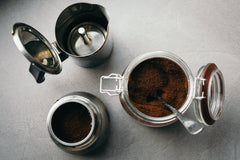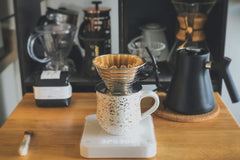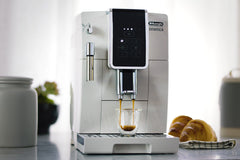Have you ever brewed a pot of coffee in the morning and then found yourself staring at it in the afternoon, wondering whether or not you should grab another mug or go to the effort of making a fresh pot?
Well, below, I’ll fill you in on all of the details when it comes to brewed coffee, the chemistry of coffee oxidization, and how to keep your brew fresh for longer.
Table of Contents
- So, just how long is brewed coffee good for?
- Understanding coffee oxidization and the chemistry behind it
- Where should you store brewed coffee?
- What about coffee with milk added to it?
- How long will caffeine stay in your brewed coffee?
- What factors cause coffee beans to degrade?
- How should you store coffee beans?
- What can you do with brewed coffee you don’t want to go to waste?
- Don’t leave your brewed coffee out for too long
- FAQ about how long brewed coffee is good for
So, just how long is brewed coffee good for?
The truth is that brewed coffee is only good for around half an hour unless it is stored in an airtight thermos.
This is because coffee keeps on oxidizing even after it has finished brewing.
The beans you use will also impact how fresh the coffee is. If you use stale grounds, you can expect the cup of coffee to be stale, even when it is technically ‘fresh.’
If you do keep your coffee in your fridge, you can consume it within a few days, simply reheating it whenever you fancy a brew.
However, the taste will deteriorate.
Understanding coffee oxidization and the chemistry behind it
Contact with air can result in roasted coffee beans oxidizing. Basically, this is just like what happens when you slice open an apple and leave the pieces out for a while.
Of course, with an apple, the oxidization process is evident, as the apple starts to brown. In the case of coffee beans, oxidization is not visible to the plain eye, yet it does have a considerable impact on the taste.
This is because oxidization results in the flavor compounds in the coffee deteriorating. They will then be released into the air upon contact.
Once you grind the beans, they start oxidizing at a quicker pace, as the surface area will increase by more than 10,000 times for fine espresso grinds.
The brewing procedure itself is actually oxidization.
When water comes into contact with the coffee beans, the beans start to release their acids, oils, and aromatics into the water. It is this chemical reaction that results in a tasty cup of coffee. You simply want to make sure this does not happen before the brewing process begins.
As you can see, heat has a considerable role when it comes to the taste of hot or cold-brewed coffee. Coffee soluble will start dissolving most effectively between 195 to 205°F, meaning when you brew coffee with hot water, the taste profile is more flavorful and full-bodied than coffee brewed with cold water or at room temperature.
Where should you store brewed coffee?
The answer to this question depends on what is in your coffee. For instance, if your coffee is black, you can store it in the carafe that it was brewed in, or any other type of airtight container.
You can store it for up to 24 hours at room temperature, but as mentioned, freshness is typically lost after 30 minutes. If you are able to seal the container, do so!
One thing I do not recommend is leaving your coffee on any sort of warming plate. Some people think this is a good way of keeping their coffee warm, however, it will result in a burnt and bitter taste pretty quickly.
So, for black coffee, store it in a covered carafe, travel mug, or thermos, and keep it in your fridge for between three and four days if you want to get as much use as possible out of it.
What about coffee with milk added to it?
If you have added milk to your coffee, it should not be left out on the counter under any circumstances.
By the time your cup has cooled to room temperature, you have missed your opportunity to drink it, as milk spoils and attracts bacteria at a rapid pace.
If you put your milky coffee straight into the fridge, you can store it for up to 48 hours safely.
How long will caffeine stay in your brewed coffee?
Unlike other flavor components that are highly volatile, caffeine is stable, and it does not evaporate or otherwise disappear once you have finished brewing. You may sense a lack of flavor and aroma, but the caffeine will not fade away.
The caffeine content in your coffee remains consistent, no matter whether your coffee is freshly brewed or you brewed it hours ago.
What factors cause coffee beans to degrade?
Coffee’s best friends are cool temperatures and darkness. Because of this, there are a few things you need to avoid when storing coffee. If you do not store beans correctly, they will lose their freshness and premium taste quickly.
Here are the four main things that cause coffee to become stale:
- Heat - Unless you are brewing coffee, heat is something it does not like! If your coffee beans are exposed to heat, they will start losing their flavor.
- Moisture - Humid conditions can make coffee beans turn bad. Your roasted coffee beans should be stored in a dry, cool area.
- Light - Coffee beans may look pretty when they are stored and displayed in a glass jar. However, glass jars are not good for coffee quality because they let light in. Your roasted coffee beans will go stale if they are stored in direct light.
- Oxygen - Finally, oxygen causes stale coffee beans. Oxygen and coffee do not mix well, causing your beans to degrade in only a matter of days when they are exposed to air.
How should you store coffee beans?

Not only should you consider how you store brewed coffee for freshness, but you also need to think about how you store coffee beans, as this impacts how fresh and tasty your cup of coffee is.
Here are some tips on doing so:
- Keep humidity and heat low - It is better to store coffee in your cabinet as opposed to a countertop, as cabinets tend to be at a cooler temperature.
- Purchase the correct amount - Do not purchase more coffee than you can utilize in the next few weeks. Purchasing too much can result in either a poor cup of coffee or waste because freshness does not last for more than a month. Coffee subscription services have become very popular in this regard, ensuring you get the right amount every month delivered straight to your door.
- Seal your coffee properly - Your coffee should always be stored in an airtight container. An opaque container is advised, meaning no light is able to penetrate it. Keep the container in a dark and cool cabinet.
>> Read the full review of the best airtight coffee storage containers
What can you do with brewed coffee you don’t want to go to waste?
If you have leftover brewed coffee, there are a number of different things you can do with it:
- Get crafty - If you have leftover coffee and you don’t want to eat it or drink it, you can get crafty instead. Coffee is regularly used as a natural dye for fabric. There are lots of different coffee craft ideas online, so if you have a creative side, this could be just the thing for you.
- Create a coffee cocktail - A coffee cocktail is a great way of using leftover coffee. Whether it is a tasty Espresso Martini or an authentic Irish Coffee, giving your coffee a new lease of life with a dash of alcohol is an idea that will appeal to many.
- Get baking - I don’t know about you, but I love a coffee-flavored treat. Baked goods with a coffee infusion are to die for. From tiramisu and chocolate coffee cake to coffee brownies, there are so many different coffee baked good recipes.
- Freeze the pot - If you have made a large pot of coffee and you realize it is not going to be consumed, you can freeze it if you’re not going to drink it in the next few days. Make sure you use an airtight container, though. When you are ready to defrost the coffee, simply move it to your fridge, and within 24 hours, you will have liquid coffee. Your coffee will stay fresher in the freezer for longer than it would if you kept it in the fridge, for example.
- Make coffee ice cubes - Coffee ice cubes have a number of uses. You can use them to make tasty caffeine-infused smoothies, keep your ice coffee cold without watering down the flavor, or cool down a hot coffee. It is easy to make them as well. Simply grab an ice cube tray and put your brewed coffee inside. Some people like adding flavoring, such as vanilla or caramel syrup, to make flavored coffee ice cubes. The possibilities are endless!
Don’t leave your brewed coffee out for too long
So there you have it: everything you need to know about brewed coffee and keeping it fresh.
Once you brew a pot of coffee, you should ideally drink it straight away. After 30 minutes, the freshness will start to disappear.
However, if you use the tips I have mentioned above, you can keep your coffee fresh for longer and, of course, there are plenty of different ways you can use your leftover brewed coffee as well.
FAQ about how long brewed coffee is good for
I hope you have found this guide on coffee freshness useful.
To finish off, I will answer some of the most common questions I receive on this subject:
Can you save coffee for the following day?
If the taste is your main concern, I would always advise throwing coffee away after a couple of hours.
However, if you are trying to save as much money as you can, you could place your leftover coffee in a sealed container.
You can then store it in the fridge and heat it up again the following day.
Can you drink coffee that has been left out overnight?
No, it is not advisable to do so. Brewed coffee will only last around half an hour before the flavor starts degrading.
If the coffee is left out all night, it will not only taste rancid and lose its pleasant fragrance but also have a sour or bitter taste.
Can you get sick from drinking old coffee?
You should not get sick from drinking old coffee. It does not go bad in the way that fruit rots or bread grow mold.
If you drink coffee beans that have passed their expiry date, you still should not get sick.
However, this does not mean that I would recommend doing so. The taste is unlikely to be a pleasant one.






